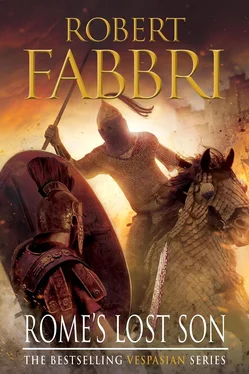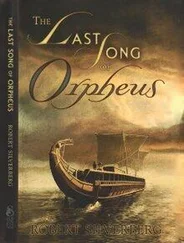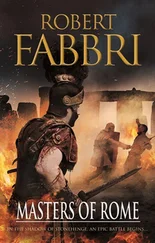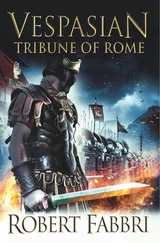Robert Fabbri - Rome's lost son
Здесь есть возможность читать онлайн «Robert Fabbri - Rome's lost son» весь текст электронной книги совершенно бесплатно (целиком полную версию без сокращений). В некоторых случаях можно слушать аудио, скачать через торрент в формате fb2 и присутствует краткое содержание. Год выпуска: 2015, ISBN: 2015, Издательство: Atlantic Books, Жанр: Исторические приключения, на английском языке. Описание произведения, (предисловие) а так же отзывы посетителей доступны на портале библиотеки ЛибКат.
- Название:Rome's lost son
- Автор:
- Издательство:Atlantic Books
- Жанр:
- Год:2015
- ISBN:9780857899668
- Рейтинг книги:5 / 5. Голосов: 1
-
Избранное:Добавить в избранное
- Отзывы:
-
Ваша оценка:
- 100
- 1
- 2
- 3
- 4
- 5
Rome's lost son: краткое содержание, описание и аннотация
Предлагаем к чтению аннотацию, описание, краткое содержание или предисловие (зависит от того, что написал сам автор книги «Rome's lost son»). Если вы не нашли необходимую информацию о книге — напишите в комментариях, мы постараемся отыскать её.
Rome's lost son — читать онлайн бесплатно полную книгу (весь текст) целиком
Ниже представлен текст книги, разбитый по страницам. Система сохранения места последней прочитанной страницы, позволяет с удобством читать онлайн бесплатно книгу «Rome's lost son», без необходимости каждый раз заново искать на чём Вы остановились. Поставьте закладку, и сможете в любой момент перейти на страницу, на которой закончили чтение.
Интервал:
Закладка:
All this echoed around his head as he led the procession towards the heir to the Julio-Claudian bloodline: a twitching, limping, dribbling fool ruled by his wife and freedmen. A scholarly historian? Perhaps. A legal pedant of some note? Certainly. But a wise emperor who weighed his words or a vain fool, dismissive of the talents of others, resentful for years of humiliation and under the mistaken impression that he was one of the finest wits of the age?
On they went up the Viminal, along the Vicus Patricius, to barely a raised voice, past the more respectable brothels of both sexes and on towards the Viminal Gate, beyond which waited the fool who drooled. Vespasian put his thoughts to the back of his mind and wondered how the Emperor would deal with a man of such dignity and so worthy of respect as Caratacus.
Then Vespasian considered what he would do were he in Claudius’ position.
The Praetorian Guard crunched to attention, shaking the ground as thousands of feet stamped down in absolute unison. Beyond the ranks and files of regimented cohorts, crows rose, in wing-beating chaos, from the rooftops of the Praetorian camp, protesting with shrill caws the interruption of their morning slumber. The sharp bellows of command and the resulting military thunder echoed between the camp’s walls and the city’s high, brick-built Servian defences for a few moments before fading abruptly to leave only the fluttering of massed banners and the faint hiss of the breeze blowing through thousands of horsehair crests, augmented occasionally by mournful bird-cry. Rigid, the men of Rome’s élite unit held their eyes to the front, unblinking, as the Senate paraded through the Viminal Gate, Vespasian at their head, bearing the gift of a captured king and his retinue to their Emperor.
Claudius was seated on one of two daises to the left of the Guard’s formation with the wives and children of the leading men in Rome to his other side. Flavia and their eight-year-old daughter, Domitilla, were seated in places of honour to the front of the women; her pride in Vespasian’s position was very apparent as she sat, bolt upright, her head turning from side to side acknowledging the real or imagined compliments of her peers, her worries over wet nurses temporarily put to one side.
The Senate progressed without haste, giving every guardsman the chance of a glimpse of the rebel King before he met his inevitable death: garrotted and self-soiled at the feet of the Emperor. Even from a distance Claudius’ nervous tic was apparent; his head jerked and his limbs shook with irregular frequency as the parade neared him.
It was with a shock of disgust that Vespasian saw the occupant of the second dais: Agrippina. Never had a woman been raised to the same level as the First Man in Rome. Not even Augustus’ wife, Livia, had sought such an honour and not even Cleopatra had achieved it when she had visited her lover and father of her son, the dictator Gaius Julius Caesar, in Rome almost a century earlier. And now here was the direct female descendant of those two great men, well into her forties, acting as if she were their equal while her uncle-husband twitched and dribbled, dabbing the drool from his chin with the edge of his toga; incongruous in his laurel wreath and purple.
Arranged around the two daises were the men and women who benefitted from their close connections with either one — or both — of the occupants. Exactly between them was Pallas, his beard and hair now flecked with grey and his face and eyes, as ever, neutral; a mask that could not be read, a mask that Vespasian had only once ever seen drop.
Between Pallas and Agrippina stood Nero: fourteen years old and with the milky-skinned face of a young god, resplendently topped by lush curls, the golden-red hue of dawn. He stood, almost side-on with his left foot pointing forward, wearing the senatorial toga that the Senate had voted him, along with the rank of proconsul, when he had come of age a mere fifteen days ago. In sharp contrast, to Pallas’ other side, stood Britannicus, ten years old and still wearing the toga praetexta of a child with its narrow purple stripe. That and his thin, lank brown hair, long face and deep-set eyes, all inherited from his father, placed him physically well in the shadow of the dazzling Prince of the Youth, as his stepbrother was now titled.
Behind Britannicus his sister, Claudia Octavia, evidently found the allure of her stepbrother hard to resist and her eyes wandered in Nero’s direction with a frequency that could not be helped in a newly pubescent maiden.
Both in their early fifties and both running to fat, Lucius Annaeus Seneca and Sosibius, tutors of Nero and Britannicus respectively, hovered near their charges, anxious that their manners should be impeccable for fear of it reflecting badly upon themselves and the consequences that it would bring.
In the shadow of the tutors lurked Narcissus and Callistus; the first bearded and bejewelled with a full figure and face, the latter wiry and bald, wringing his hands and flicking his eyes here and there as if surrounded by enemies. Both still held positions of power but neither had the influence with the Emperor that they had once held; Pallas had seen to that. Narcissus caught Vespasian’s eye and gave the faintest of nods, surprising Vespasian: it was unlike Narcissus to be so indiscreet; he looked away wondering if that was a sign of desperation on the freedman’s part.
Vespasian’s gaze then alighted on his lover of over twenty-five years now: Caenis, as beautiful as ever with her sapphire-blue eyes, smiling briefly at him as he came to a halt just five paces away from the dais. Having been Narcissus’ secretary until Pallas had commandeered her services as he emerged victorious in the struggle to become the Master of Rome, she stood ready to record the speeches on wax tablets with a slave supporting a desk on his shoulders kneeling before her. Loved by Vespasian and tolerated by Flavia, she was the woman whom he could never marry as a result of the injunction on senators marrying freedwomen; she had been born a slave.
Vespasian’s lictors and those of all the other magistrates moved away to the left, leaving a swathe of senators surrounding the prisoners.
There was a pause as Claudius endeavoured to collect himself, his mouth working hard as he tried to form his first word. With a spray of saliva it finally came: ‘W-w-w-what does my loyal S-S-Senate bring before m-m-me?’
Vespasian took a couple of steps towards the Emperor. ‘Princeps and colleague in the consulship, we have the honour to bring a gift from Publius Ostorius Scapula, the Governor of the province of Britannia, on behalf of all the Senate. We have the rebel King, Caratacus of the Catuvellauni, and the remainder of his followers here in chains.’
Despite the fact that the whole event had been choreographed for this moment, Claudius feigned surprise. ‘Caratacus? I know of the name. What would you have me do with him?’
‘We ask for your judgement upon him.’
‘His c-c-crime?’
Vespasian struggled to keep his face dignified as he played out the farce with the fool. ‘He is the man who refused to bow to you after your glorious pacification of the island.’ This, Vespasian knew, was stretching the truth by a considerable margin. The island of Britannia was far from conquered but that could not be admitted publicly, seeing as the Emperor had already celebrated a Triumph for his victory there and then graciously allowed Aulus Plautius an Ovation upon his return. It was for this reason that Caratacus had been paraded from the Forum for execution outside the city walls rather than the other way around as in a Triumph. To imply that the military operations, involving four legions and the equivalent in auxiliaries, still raging in the infant province were anything more than local mopping-up operations against a handful of rebels would be to invalidate Claudius’ victory and call into question his Triumph. Securing Claudius’ position as emperor with the glory of conquest had been his freedmen’s whole object when they had ordered the militarily ill-conceived venture.
Читать дальшеИнтервал:
Закладка:
Похожие книги на «Rome's lost son»
Представляем Вашему вниманию похожие книги на «Rome's lost son» списком для выбора. Мы отобрали схожую по названию и смыслу литературу в надежде предоставить читателям больше вариантов отыскать новые, интересные, ещё непрочитанные произведения.
Обсуждение, отзывы о книге «Rome's lost son» и просто собственные мнения читателей. Оставьте ваши комментарии, напишите, что Вы думаете о произведении, его смысле или главных героях. Укажите что конкретно понравилось, а что нет, и почему Вы так считаете.












